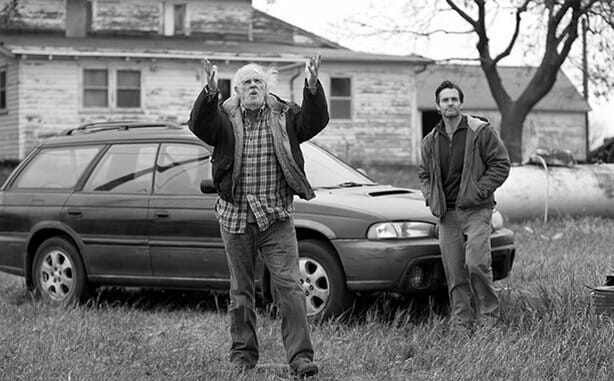Nebraska (2013 Cannes review)

The first question at the Cannes press conference for Nebraska, the new film from Alexander Payne, was about why the director decided to shoot his comedy-drama in black and white. It’s an understandable query. Studios don’t like black-and-white movies from a commercial perspective and, because Payne’s films emphasize character and dialogue, they’re not necessarily thought of as being grandly cinematic, which might require such a striking look. But after seeing the film, the choice makes more than a little sense. Payne doesn’t use black and white to make his movie grand. Quite the contrary, he uses the lack of color to illustrate his characters’ tiny, quiet existence. To paraphrase a line from Paul Simon, their lives are so common they practically disappear.
Nebraska is much in the same vein as Payne’s last film, The Descendants, in that it has inklings of being a comedy when really it’s just a melancholy drama with the occasional chuckle. After venturing to California wine country for Sideways and Hawaii for The Descendants, he’s back in his native Nebraska, which in his early films (best of all, Election) he chronicled with fondness but also a clear-eyed candor. In his Midwestern films, his protagonists are often coping with lives that aren’t quite as happy as maybe they would have hoped. They don’t have big dreams—it’s not as if they want to be musicians or champion boxers or astronauts—but still they’ve fallen into mediocrity and regret. Payne may poke fun at them, but the deep affection for their foibles is just as evident.
His new film is filled with these disgruntled sorts. It stars Will Forte as David Grant, an electronics salesman living in Billings, Montana, the same town where his parents now reside. His father, Woody (Bruce Dern), is a miserable cuss: He drinks too much, can’t hear very well, and generally wants to be left the hell alone, especially by his wife Kate (June Squibb). Woody’s mental faculties are fading, demonstrated by the fact that he’s giddy about winning a million dollars. He hasn’t, of course, but he assumes that he has because of a sweepstakes offer that came in the mail saying that he did. (Woody isn’t interested in the fine print.) The catch is that he has to go Lincoln, Nebraska, to redeem his money, and although David knows that the whole thing is nonsense, he reluctantly agrees to drive his father, figuring if it’ll make the old man happy, what’s the harm?
This father-and-son road movie has certain conventionalities embedded in its DNA. But whether because of the black-and-white images or the stripped-down sparseness of Payne’s compositions, Nebraska feels somewhat different than his other films. It’s a little more deadpan and a little more depressive. And it’s the first time that Payne’s ability to create emotional wallops based on understated scenes felt a bit mechanical. Such moments still work, but you can see the strings being pulled. Maybe not surprisingly, then, the movie represents a sort of crossroads for Payne—appropriate choice of words for a road-trip film—in which he’s trying to find new ways to express familiar sentiments. (The critical consensus from Cannes about Nebraska is that it’s “minor Payne.” I think it might be more accurate to call it a transitional film, with one foot in his old techniques and one tentatively standing in new ones.)